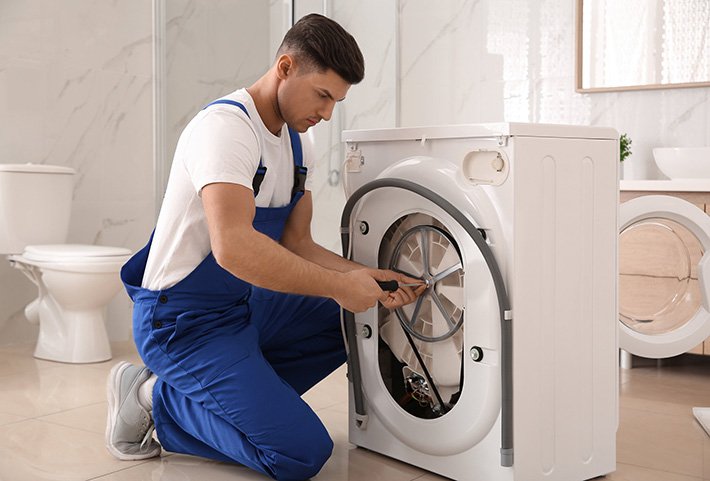We know washers are the must-have machines in our homes. It saves us a ton of time and money to do laundry at the house—some people even consider it a deal-breaker when looking for a place to rent.
Now with every “pro” comes a “con.” Suppose you’re like some people that don’t have landlords with maintenance specialists to check out the machine. In that case, you may become the handyperson for most things in your home. However, knowing a few basic troubleshooting steps for declogging a dishwasher is one thing.
The moment you’re tempted to spend hours on Youtube trying to fix your washing machine is when you risk increasing the repair bill.
So before you decide whether to hire someone to look at your washer that’s suddenly acting strange, think to yourself, “Is it time to replace my washer?”
Most people don’t know when it’s time to replace their washers. We’ve only seen it work, so it’s fair to say we don’t really know what to look for when it’s reaching its “end-of-life.”
So below are a couple of things to look out for that’ll suggest it’s time to replace your washer.
1. Your washer is suddenly much louder than usual.
Washers typically hum, especially the newer ones. And the older models tend to be a little noisier. But we can all agree that your washing machine should NOT sound like an airplane speeding up for takeoff.
It’s definitely hard to miss.
If your washer is louder than usual, there may be a problem with the drum bearing. Most likely, it’s failing or already broken.
Regardless, replacing the drum bearing can get expensive and not ideal for repairing if you have a washer older than 10 years old.
2. Your washer is 10 years old or older.
Speaking of washers older than 10, if yours is entering the new year with double digits, it’s time to consider a new machine.
It’s entirely normal for older machines to require more frequent repairs. Think of an older car. The more miles it has on it, the more often you’re paying a visit to the mechanic.
To save you time and money, start shopping around for new washers. Even if you wait for the washer to break down or require another more expensive repair, at least you’ll know precisely what its replacement should be.
When the time comes, you’ll pick up a new washer instead of paying a visit to the laundromat.
3. Your washer is leaking.
The last thing you want to see is the water that’s supposed to fill the washer tub spilling onto your floor.
If your washer is leaking, there are a couple of things it could be:
● The drain hose is loose
● The drain hose is punctured
● The drain pump is faulty
● The hose from the tub to the pump is worn out
Of course, it could be something else. But these are issues you can easily see from outside of the washer. Other causes could be internal and more difficult for you to get to alone.
But overall, if your washer leaks, you mustn’t use it until the issue is fixed or the washer is replaced altogether.
Now, if the leaking water finds its way into the motor, then you’ll really need to replace the washer. The water will end up spilling into the motor and cause it to fail altogether.
4. Something in your washer smells.
Sure, you’d figure a particular smell comes with dirty laundry. But that’s before the clothes go into the washer.
What if the washer smells after it has completed a cycle?
Simple. When all the dirt, scum, hair, and oils from our bodies accumulate in the washer, it can cause a build-up. Mildew, mold, and bacteria are all results of build-up left lingering cycle after cycle.
It’s why it’s recommended to have the washer complete a cycle without clothes every now and then—specifically with some baking soda—to help remove and prevent build-up.
Otherwise, the odor-causing bacteria, mold, and mildew find their way deeper and deeper into the washer’s components.
And suppose the smell doesn’t go away after multiple water cycles with baking soda. In that case, you may want to consider replacing it.
5. Your washer is wobbling to the beat of its own cycle.
Yes, some washers have a cute little tune to let you know it’s finished. But that tune is for you to make a new TikTok dance, not for your washer to dance to.
A washer wobbles a little during the rinse cycle. That’s normal.
Now, if it started washing on point A and landed at point B, you’ve got a walking washer.
Often times it’s an easy fix. First, check the machine to see which of its legs are affecting its balance. Leveling the washer with a new foot pad usually fixes the issue.
If it’s still walking around, double-check the number of clothes you’re washing at once. If your washer is aggressively going through the spin cycle, it could be because the load is too large, throwing it off balance.
And you guessed. If this doesn’t fix the issue, maybe it’s time for a new washer.
Some repairs are just too advanced for a DIY attempt.
Of course, there are a few things you can figure out on your own. Checking external hoses for holes or loose hoses is manageable, and so is looking for a wobbling foot.
But once it’s determined that the issue is internal, it’s time to take a step back and start thinking, “Is it worth it to repair my washer?” Depending on what needs to be repaired, it could end up costing two-thirds of a brand-new washer—don’t forget the repairman’s service fee.
So start paying closer attention to your washer, especially if it’s an older model that’s been around for a while. You may soon have to decide whether to start shopping for a new washer.
Need help deciding?
Should you repair your failing washing machine or not? Is it really time to buy a new washing machine? Affordable Appliance Repair of West Michigan will help you make that decision! As home appliance professionals, we know our business and have seen just about every appliance fail there is. If it’s worth fixing, we’ll do it and make sure its done right. Customers call us for quick, dependable service and expert repair. So if you need help with one of your home appliances or are trying to decide if it’s worth repairing, call and schedule a repair service right away!

